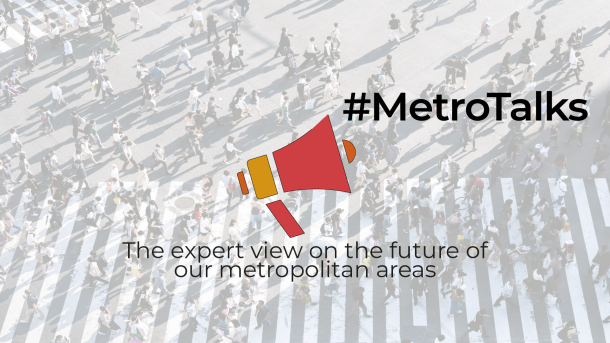
MetroTalks: Open dialogues on the post-Covid urban future at an opportune moment
People in slums and informal settlements, women, workers in the informal economy and more… The devastating consequences of the Covid-19 pandemic have not had the same impact on the quality of life across the different groups living in cities and metropolises. The pandemic has highlighted that the inequality in the way we plan and develop our urban areas still persists. The city model that the pandemic leaves in its wake must be
Through MetroTalks, a series of open dialogues available on multiple media formats (video, audio, infographic and transcription), we bring ideas to the table on how our cities and metropolises can recover from and adapt to the Covid-19 pandemic. These dialogues are a continuation of the manifesto ‘Call to rethink our metropolitan spaces’, which was launched in May 2020 and endorsed by more than 30 international and local institutions.
In the three broadcasts launched to date, which are presented by Octavi de la Varga, Secretary General of Metropolis, and count on collaboration from a wide range of international experts, we have addressed some of the most essential aspects for rethinking cities.
Rethinking Public Spaces
In the first conversation, Helle Søholt, CEO and founding partner of Gehl, and Samuel Kling, Global Cities Fellow at the Chicago Council on Global Affairs, discussed how to “build inclusive healthy public spaces”. Emphasis was placed on the need to ensure that public spaces properly reflect the needs of communities, especially when dealing with large populations (watch the full conversation here).
“While we have so much data on economic performance in cities, we have no data available on how people behave and use their neighbourhoods, spaces, streets, and squares”, Helle Søholt
For Søholt, city planning is no longer linear, and decision-making requires a willingness to try out and use evidence to understand what works. Accordingly, it is extremely important to make social data available to decision-makers during this time of transformation.
“While we have so much data on economic performance in cities, we have no data available on how people behave and use their neighbourhoods, spaces, streets, and squares”, she points out.
Developing sustainable urban mobility
“We've been planning our mobility services focused on getting good value for money, while we might have to think of customer orientation in a different way, considering new habits and travel demand”, Hanne Norli
Another of the issues we have reflected on—alongside Hanne Norli, Market Director at the Norwegian Railway Directorate, and Mohamed Mezghani, UITP Secretary General—is sustainable mobility, focusing on the future of urban mobility and the new mobility patterns emerging in cities after the pandemic. According to Norli, “We've been planning our mobility services focused on getting good value for money, while we might have to think of customer orientation in a different way, considering new habits and travel demand.” (Watch the full conversation here).
Inclusive urban planning: Making the invisible visible
In our last MetroTalk, we focused on the problem of housing quality and the fact that it is not affordable for everyone (watch the full conversation here).
In the words of Jane Weru: “It’s not about moving or removing slums; it’s about appreciating that the people who live there are an essential part of the city.”
Without a doubt, urban inequality is one of the main challenges to be addressed during Covid-19 recovery, with a view to long-term transformation.
It is more than likely that cities and metropolises will overcome the pandemic, but how prepared they are for the next crisis will depend on the extent to which they address major challenges, like the ones presented in this series.
In order to help the series reach everyone, we offer the MetroTalk dialogues in different formats, such as video, podcast and infographics, which are available here: metropolis.org/metrotalks

